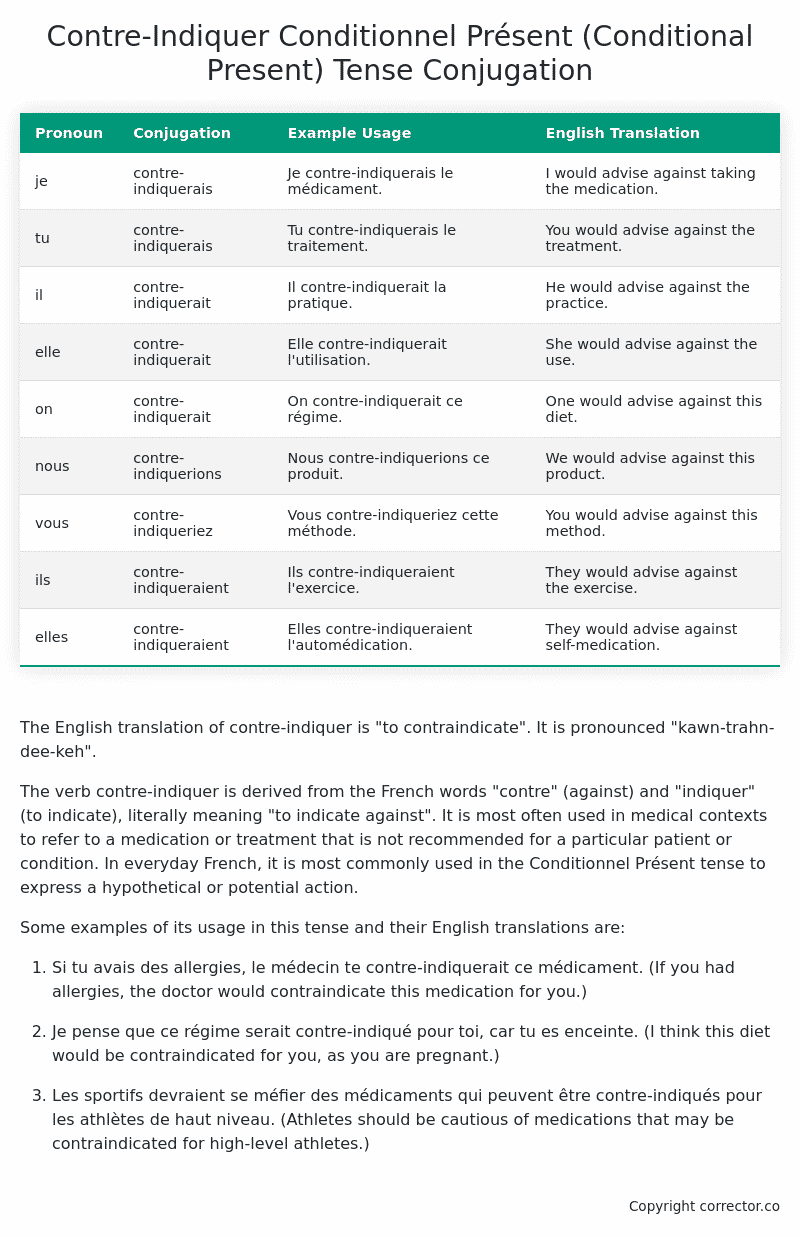Conditionnel Présent (Conditional Present) Tense Conjugation of the French Verb contre-indiquer
Introduction to the verb contre-indiquer
The English translation of contre-indiquer is “to contraindicate”. It is pronounced “kawn-trahn-dee-keh”.
The verb contre-indiquer is derived from the French words “contre” (against) and “indiquer” (to indicate), literally meaning “to indicate against”. It is most often used in medical contexts to refer to a medication or treatment that is not recommended for a particular patient or condition. In everyday French, it is most commonly used in the Conditionnel Présent tense to express a hypothetical or potential action.
Some examples of its usage in this tense and their English translations are:
-
Si tu avais des allergies, le médecin te contre-indiquerait ce médicament. (If you had allergies, the doctor would contraindicate this medication for you.)
-
Je pense que ce régime serait contre-indiqué pour toi, car tu es enceinte. (I think this diet would be contraindicated for you, as you are pregnant.)
-
Les sportifs devraient se méfier des médicaments qui peuvent être contre-indiqués pour les athlètes de haut niveau. (Athletes should be cautious of medications that may be contraindicated for high-level athletes.)
Table of the Conditionnel Présent (Conditional Present) Tense Conjugation of contre-indiquer
| Pronoun | Conjugation | Example Usage | English Translation |
|---|---|---|---|
| je | contre-indiquerais | Je contre-indiquerais le médicament. | I would advise against taking the medication. |
| tu | contre-indiquerais | Tu contre-indiquerais le traitement. | You would advise against the treatment. |
| il | contre-indiquerait | Il contre-indiquerait la pratique. | He would advise against the practice. |
| elle | contre-indiquerait | Elle contre-indiquerait l’utilisation. | She would advise against the use. |
| on | contre-indiquerait | On contre-indiquerait ce régime. | One would advise against this diet. |
| nous | contre-indiquerions | Nous contre-indiquerions ce produit. | We would advise against this product. |
| vous | contre-indiqueriez | Vous contre-indiqueriez cette méthode. | You would advise against this method. |
| ils | contre-indiqueraient | Ils contre-indiqueraient l’exercice. | They would advise against the exercise. |
| elles | contre-indiqueraient | Elles contre-indiqueraient l’automédication. | They would advise against self-medication. |
Other Conjugations for Contre-Indiquer.
Le Present (Present Tense) Conjugation of the French Verb contre-indiquer
Imparfait (Imperfect) Tense Conjugation of the French Verb contre-indiquer
Passé Simple (Simple Past) Tense Conjugation of the French Verb contre-indiquer
Passé Composé (Present Perfect) Tense Conjugation of the French Verb contre-indiquer
Futur Simple (Simple Future) Tense Conjugation of the French Verb contre-indiquer
Futur Proche (Near Future) Tense Conjugation of the French Verb contre-indiquer
Plus-que-parfait (Pluperfect) Tense Conjugation of the French Verb contre-indiquer
Passé Antérieur (Past Anterior) Tense Conjugation of the French Verb contre-indiquer
Futur Antérieur (Future Anterior) Tense Conjugation of the French Verb contre-indiquer
Subjonctif Présent (Subjunctive Present) Tense Conjugation of the French Verb contre-indiquer
Subjonctif Passé (Subjunctive Past) Tense Conjugation of the French Verb contre-indiquer
Subjonctif Imparfait (Subjunctive Imperfect) Tense Conjugation of the French Verb contre-indiquer
Conditionnel Présent (Conditional Present) Tense Conjugation of the French Verb contre-indiquer (this article)
Conditionnel Passé (Conditional Past) Tense Conjugation of the French Verb contre-indiquer
L’impératif Présent (Imperative Present) Tense Conjugation of the French Verb contre-indiquer
L’infinitif Présent (Infinitive Present) Tense Conjugation of the French Verb contre-indiquer
Struggling with French verbs or the language in general? Why not use our free French Grammar Checker – no registration required!
Get a FREE Download Study Sheet of this Conjugation 🔥
Simply right click the image below, click “save image” and get your free reference for the contre-indiquer Conditionnel Présent tense conjugation!

Contre-Indiquer – About the French Conditionnel Présent (Conditional Present) Tense
Formation
Common Everyday Usage Patterns
Expressing Polite Requests
Expressing Hypothetical Situations
Expressing Doubt or Uncertainty
Interactions with Other Tenses
Present Tense
Past Tense
Future Tense
Conditional Perfect
Summary
Want More?
I hope you enjoyed this article on the verb contre-indiquer. Still in a learning mood? Check out another TOTALLY random French verb conjugation!


